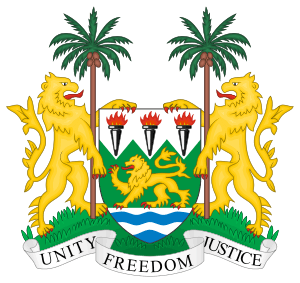1924 Sierra Leonean general election
General elections were held in Sierra Leone Colony and Protectorate for the first time on 28 October 1924.[1] The National Congress of British West Africa won all three seats.[2]
 |
|---|
| This article is part of a series on the politics and government of Sierra Leone |
|
Legislative |
|
|
|
|
|
Electoral system
The 1924 constitution introduced a 22-member Legislative Council, of which twelve members were government officials. The other ten members included two appointed Europeans representing commercial interests, three elected Africans from the Colony, three appointed paramount chiefs from the Protectorate (two Mende and one Temne), one representing each province, and two appointed Africans from the Colony.[3]
The three elected seats were elected from single-member constituencies, two urban and one rural. Voting was restricted to literate Africans over the age of 21 who owned at least £10 of property in the urban constituencies or £6 in the rural constituency. From the population of approximately 25,000, only 1,866 people registered to vote; 1,016 in Freetown, 511 in the other urban constituency and 339 in the rural constituency.[3]
Results
| Constituency | Elected member | Party | Votes |
|---|---|---|---|
| First Urban | Ernest Beoku-Betts | National Congress of British West Africa | 607 |
| Second Urban | Herbert Bankole-Bright | National Congress of British West Africa | 562 |
| Rural | Albert Tuboku-Metzger | National Congress of British West Africa | 173 |
| Source: Wyse | |||
The unsuccessful candidates included former mayor of Freetown Samuel Barlatt (373 votes) and John Songo-Davies (199 votes). Only 12 of the votes cast were invalid.[1]
Aftermath
Following the elections, Governor Charles Turner appointed three paramount chiefs; Bai Kumba of the Mande Chiefdom, Bai Kompa of Koya Temne and Tucker of the Nangoba Bullom chiefdom.[4]
References
- Akintola Wyse (2003) H. C. Bankole-Bright and Politics in Colonial Sierra Leone, 1919-1958, Cambridge University Press, p57
- John-Peter Pham (2005) Child Soldiers, Adult Interests: The Global Dimensions of the Sierra Leonean Tragedy, Nova Publishers, p24
- Dolf Sternberger, Bernhard Vogel, Dieter Nohlen & Klaus Landfried (1978) Die Wahl der Parlamente: Band II: Afrika, Zweiter Halbband, p1884
- Wyse, p58